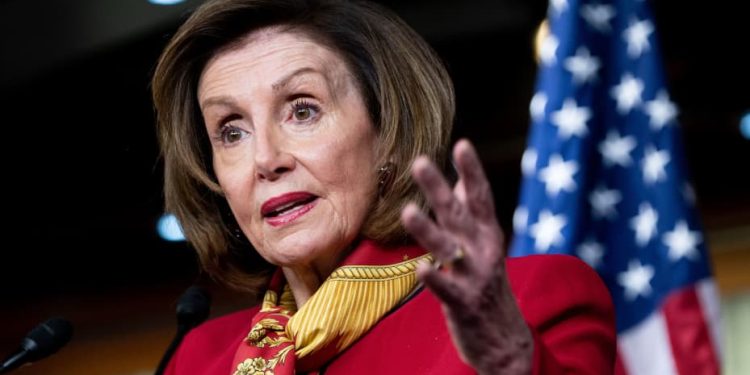Whether admired or criticized, Nancy Pelosi has undeniably been one of the most influential figures in modern American politics. During her tenure as Speaker of the House, she led the charge on landmark achievements that many Democrats once thought impossible. She guided her caucus through the challenging Obama years, securing the passage of the Affordable Care Act and navigating a period of intense partisan gridlock.
Her legacy as a shrewd tactician and powerful fundraiser is firmly cemented, and she will always be remembered as the first woman to hold the Speaker’s gavel. However, even the most formidable leaders must eventually step aside to allow the next generation to take over. For Pelosi, that moment has arrived—but she remains reluctant to let go of her influence, a decision that risks tarnishing her legacy.
Pelosi’s role as “leader emerita” has caused friction within the Democratic caucus, a group already known for its internal divisions. In recent months, her public comments—particularly those criticizing President Biden and the party’s 2024 strategy—have frustrated many House Democrats, leading to renewed calls for her full retirement from politics. As Axios recently reported, some party members believe her actions are not just unhelpful, but actively damaging.
The frustration with Pelosi is palpable, particularly in private conversations within the Democratic caucus. Despite efforts to smooth things over, Pelosi’s recent actions, including an interview with The New York Times, have reignited tensions. While the interview offered compliments and caveats, it ultimately sparked controversy when Pelosi suggested that President Biden should have stepped aside earlier to allow other candidates to enter the 2024 race. Her comments shifted attention away from the future and toward past divisions, at a time when Democrats should be rallying around Hakeem Jeffries and focusing on strategy for the coming years.
A Legacy of Leadership, But Not Without Faults
Pelosi’s impact on the Democratic Party’s agenda is undeniable. Her ability to unite the caucus during critical legislative battles is legendary. However, it’s also important to recognize the fractures that emerged under her leadership. As the progressive wing of the party became more vocal, Pelosi struggled to balance their demands with those of more moderate members in swing districts. The result was a party often at odds with itself, even as it celebrated legislative victories.
These divisions have only worsened since Pelosi handed the gavel to Hakeem Jeffries, the current House Minority Leader and the first Black lawmaker to lead a party in Congress. While Pelosi has praised Jeffries publicly, her actions tell a different story. By continuing to exert influence through public comments and behind-the-scenes maneuvers, she has made it harder for Jeffries to fully establish himself as the undisputed leader of House Democrats.
The Hakeem Jeffries Era
Hakeem Jeffries faces his own challenges as the Democratic Party navigates a precarious political landscape. Despite initial optimism, Democrats failed to regain the House in 2024, and Jeffries has taken responsibility for the party’s shortcomings, acknowledging that “the buck stops with me.” However, for Jeffries to successfully lead the party forward, he needs clear, decisive leadership—something that is complicated by Pelosi’s continued presence in the background.
Democratic lawmakers who spoke to Axios anonymously expressed a growing sentiment: It’s time for Pelosi to step aside. One senior Democrat remarked, “She needs to take a seat.” Another added, “Making scattershot comments is not just unhelpful, it’s damaging.” A lawmaker from the Congressional Black Caucus also noted that while Jeffries has been “tremendously graceful and respectful” toward Pelosi, “I don’t think she is being respectful of him.”
Overstaying Her Welcome
Pelosi’s danger in staying too long isn’t just political; it’s reputational. While her legacy as a trailblazer and skilled legislator is secure, her ongoing involvement in the party’s strategy risks overshadowing her achievements. Instead of being remembered as a groundbreaking leader who guided Democrats through historic victories, she risks being seen as someone who couldn’t let go, even when her presence became a hindrance.
This is not just a matter of ego; it’s about respect for the institution she has long served. Great leaders know when to pass the torch, and the Democratic Party is now undergoing a generational shift, with younger leaders like Jeffries taking on roles that reflect the party’s future. By holding on to her behind-the-scenes influence, Pelosi undermines the progress she championed throughout her career.
A Graceful Exit
Nancy Pelosi has had an extraordinary career. She shattered glass ceilings, shaped American policy, and left an indelible mark on the Democratic Party. However, even the most storied careers must come to an end, and Pelosi’s refusal to step aside fully is now doing more harm than good.
Hakeem Jeffries deserves the chance to lead without interference and to unify the caucus under his vision for the future. Pelosi’s contributions to the party will not be forgotten, but her continued presence on the national stage threatens to overshadow her accomplishments. It’s time for her to honor her own legacy by gracefully stepping back, allowing the next chapter of Democratic leadership to begin.
For better or worse, it’s now Hakeem Jeffries’ caucus. Pelosi should accept that reality, step aside, and allow the future of the Democratic Party to unfold without unnecessary distractions.
 Telegram is where we really talk. Don't miss out!
Telegram is where we really talk. Don't miss out!







